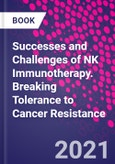Successes and Challenges of NK Immunotherapy: Increasing Anti-tumor Efficacy describes the unique therapeutic applications of NK cells to fight cancers and eliminate the bulk and subset of cancer stem cells responsible for metastasis, relapse and recurrences. The book provides information on the development, engineering, mechanisms of action, response to various preclinical models, and applications in various clinical trials. Sections cover the development of highly engineered cytotoxic NK cells, their mechanisms of action, preclinical and clinical applications, the development and application of CAR-NK cells, and new NK-drug conjugates, also emphasizing that activated NK cells can target and kill highly resistant cancer stem cells.
Written by the leading experts on NK immunotherapy worldwide, this is a valuable resource for researchers, clinicians and members of the biomedical field who are interested in understanding novel and efficient therapies to fight cancers.
Please Note: This is an On Demand product, delivery may take up to 11 working days after payment has been received.
Table of Contents
Section 1: Modulation of NK Antitumor Activities1. Engineered Human Pluripotent Stem Cell-Derived NK Cells with Improved Anti-tumor Activity2. The Cancer NK cell Immunity Cycle3. Immunometabolic reprogramming of NK cells for immunotherapy of solid tumors4. Immunoregulation of NK cells: Similarities and Differences Compared to T cells5. Tracking the decay of TGFb-resistant NK cells identifies an immune clock of innate cell aging
Section 2: Regulation of NK Antitumor Activities6. Oncolytic virus therapy for cancer; role in activation of NK cells7. Rendering NK cells resistant to immune suppression: genetic modification with a dominant negative receptor for TGF-Beta8. Cystatin F, an inhibitor of cysteine cathepsins, regulates the cytotoxicity of NK cells9. The NCR2-PCNA Immune Checkpoint and Natural Killer-based immunotherapy10. Tumor derived soluble human NKG2D ligand mediated perturbations in NK cell metabolism and therapeutic implications11. The expression of high affinity recombinant Fc receptors by engineered natural killer cells to enhance cancer cell killing by ADCC
Section 3: NK Antitumor Immunotherapy12. The many key functions of Natural Killers cells in premalignant and malignant stages of tumorigenesis; when these gatekeepers are gone or defective anarchy ensues13. Phenotypic plasticity: the emergence of cancer stem cells and collective cell migration14. Stem cell-engineered invariant natural killer T cells for cancer immunotherapy15. Natural killer cells in the glioblastoma stem cell niche microenvironment16. CAR-redirected Cytokine-Induced Killer lymphocytes against sarcomas17. The Effect of Natural Killer Cells on HIV-1 Rebound in Humanized Mice
Section 4: NK Antitumor Immunotherapy 218. NK cells are innate actors in the immunosurveillance of melanoma19. Patients with prostate cancer associate with altered features of Natural Killer cells in terms of pro-angiogenic function and M2-like macrophage polarization capacity20. New therapeutic approaches to target malignant gliomas21. Mobilizing Human iNKT cells for Cancer Immunotherapies22. Initial Innate Immune Responses to Tumor Metastasis23. Regulating NK cell homeostasis and function by tumor associated NKG2D ligand MIC24. Natural Killer Cells in Cancer Immunotherapy and Oncolytic Virotherapy
Section 5: General Concluding Remarks and Future Perspectives
Authors
Benjamin Bonavida Professor, Department of Microbiology, Immunology and Molecular Genetics, David Geffen School of Medicine, University of California, USA.Dr Bonavida has vast expertise and various reported publications in the field of tumor cell sensitization to chemotherapy (a total of greater than 500 publications) and in particular the novel role of Nitric Oxide (NO) donors in chemo-sensitization and reversal of drug resistance. In addition, he was the first scientist to co-organize an international meeting on the topic (First International Workshop on NO and Cancer, 2005).
Anahid Jewett National Institute of Health Study Sections, UCLA, USA. Dr. Anahid Jewett, PhD, MPH, is well-known nationally and internationally for her contribution to the field of NK biology, tumor immunology and cancer immunotherapy. She serves on the editorial board of many prestigious journals and has been a reviewer on the board of National Institute of Health study sections. She holds several patents and has published more than 100 high impact journal articles, reviews, commentaries and book chapters in the field of cancer. Dr. Jewett's major contributions to science and NK cell biology were the identification, characterization and the establishment of the concept of split anergy in NK cells, establishment of the role of NK cells in elimination, selection and differentiation of cancer stem cells as well as healthy stem cells, and methods to generate large numbers of super-charged NK cells which are in use currently in clinical trials of cancer patients.







